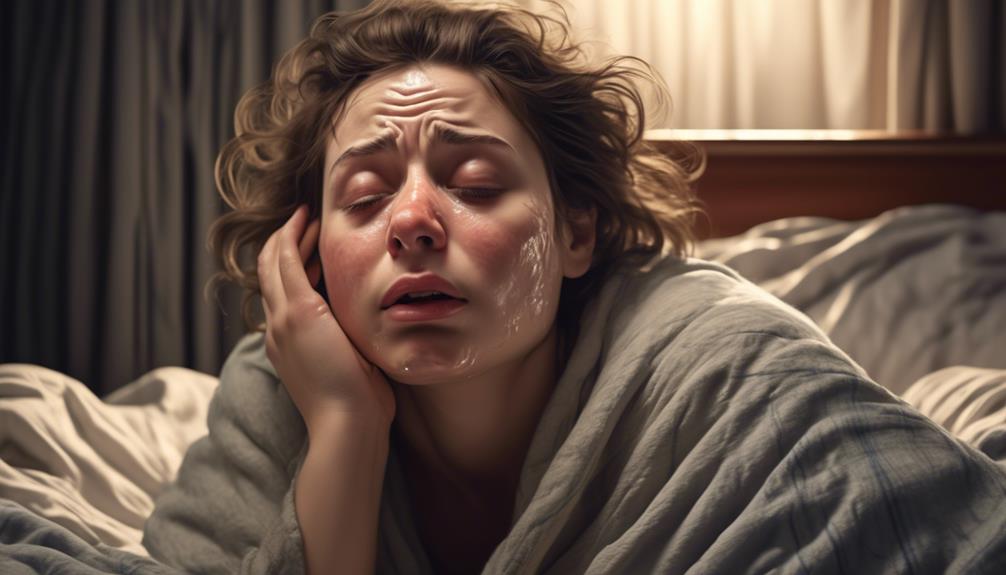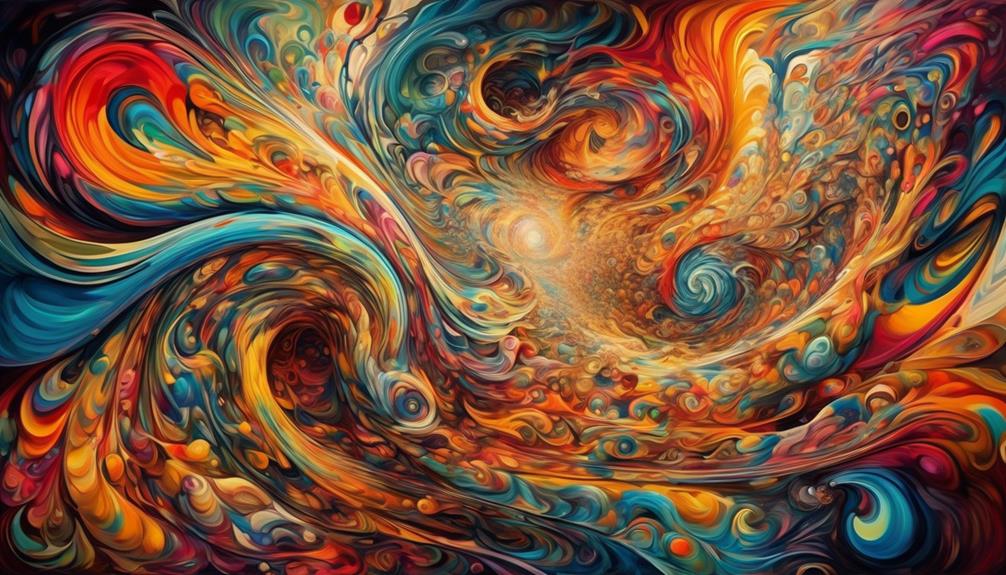The phenomenon of fever-induced hallucinations and their mysterious occurrences has intrigued many individuals. Could it be that these misleading visions are simply a byproduct of our body’s elevated temperature? While some may dismiss this idea as speculation, delving deeper may uncover a more profound relationship.
Let's explore the science behind fever-induced hallucinations and unravel the complexities that lie within this intriguing phenomenon.
Key Takeaways
- Fever-induced hallucinations occur when the brain's functioning is impaired due to high body temperature.
- Fever-induced hallucinations typically do not require specific treatment.
- High fevers, especially when very high, are the primary risk factor for fever-induced hallucinations.
- Resolving the underlying illness causing the fever is crucial in treating fever-induced hallucinations.
The Science Behind Fever Hallucinations
Fever hallucinations, also known as delirium, arise from the brain's impaired functioning due to high body temperature. When the body experiences a fever, the elevated temperature can disrupt the normal processes of the brain, leading to hallucinations. Individuals may see, hear, or even smell things that aren't actually present. These hallucinations are a direct result of the fever and typically don't require specific treatment.
If someone is experiencing fever hallucinations, it's essential to address the underlying cause by reducing the fever. Over-the-counter medications like ibuprofen can help lower the body temperature. However, if the hallucinations persist or are accompanied by other concerning symptoms, it's crucial to seek medical care. A healthcare provider can offer a proper diagnosis or treatment plan tailored to the individual's needs.
Monitoring the fever and staying hydrated are also important aspects of managing fever hallucinations. Remember, seeking professional medical advice is key to ensuring the well-being of those experiencing fever-related hallucinations.
Common Types of Fever-Induced Hallucinations

In cases of fever-induced hallucinations, various sensory experiences can manifest due to the brain's impaired functioning at elevated body temperatures. These hallucinations can be distressing and confusing, impacting individuals experiencing them.
Here are common types of fever-induced hallucinations:
- Visual Hallucinations: Seeing things that aren't actually present, such as shadows, lights, or objects.
- Auditory Hallucinations: Hearing things like voices, music, or sounds that don't exist in reality.
- Olfactory Hallucinations: Smelling odors that aren't there, which can range from pleasant to foul scents.
- Tactile Hallucinations: Feeling sensations on the skin, such as tingling, crawling, or pressure, without any external cause.
If fever hallucinations are accompanied by severe symptoms like seizures or chest pain, it's crucial to seek immediate medical attention. Hydration and managing the fever with appropriate medications like acetaminophen or ibuprofen can help alleviate fever-induced hallucinations.
Risk Factors for Fever-Related Hallucinations
Identifying potential risk factors for fever-induced hallucinations involves understanding various factors that can contribute to the development of these sensory disturbances. High fevers, especially when the fever is very high, are the primary risk factor for experiencing fever-induced hallucinations. Such hallucinations happen because the elevated body temperature affects the brain's normal functioning, leading to sensory disturbances like seeing or hearing things that aren't present.
It's crucial to note that fever-induced hallucinations are more common in children, particularly when they're experiencing serious infections. Parents may become alarmed when seeing their child in such distress, hearing sounds, or seeing their child react to unseen stimuli. In most cases, fever-induced hallucinations are short-lived and don't require specific treatment. However, managing the fever with appropriate medications like acetaminophen (Tylenol) or ibuprofen (Advil) can help alleviate the symptoms and prevent further complications.
If the fever is very high or persists, seeking medical attention is advisable to address any underlying issues that may be causing the hallucinations.
Treatment Options for Fever-Triggered Hallucinations

Understanding potential risk factors for fever-induced hallucinations is crucial, and addressing the underlying illness causing the fever is key in resolving hallucinations triggered by elevated body temperature.
When it comes to treating fever-triggered hallucinations, several options can help alleviate symptoms and promote recovery:
- Treating Underlying Illness: Resolving the root cause of the fever is essential to managing fever-induced hallucinations effectively.
- Over-the-Counter Remedies: Medications like acetaminophen and ibuprofen can help lower fever and reduce hallucinations.
- Hydration: Staying hydrated by consuming plenty of fluids is vital during febrile episodes to aid in managing hallucinations.
- Temperature Management: Using cold compresses or taking lukewarm baths can provide comfort, lower body temperature, and potentially reduce hallucinations.
If fever-induced hallucinations persist or worsen despite these measures or are accompanied by other concerning symptoms, seeking medical attention promptly is advisable.
When to Seek Medical Help for Fever Hallucinations
Recognizing the urgency of seeking medical assistance for fever-induced hallucinations is crucial for ensuring prompt evaluation and appropriate intervention. When it comes to fever hallucinations, especially in children, seeking medical help is essential to rule out serious underlying conditions such as delirium or infections. If you, your child, or a loved one experience fever-induced hallucinations, it is important not to delay in reaching out for medical assistance. Here is a guide to help you understand when to seek medical help for fever hallucinations:
| When to Seek Medical Help for Fever Hallucinations | Action |
|---|---|
| Young child experiencing first fever hallucinations | Seek a doctor's advice |
| Fever hallucinations accompanied by severe confusion or delirium | Seek immediate medical attention |
| Parents feeling scared or unsure about the situation | Contact a healthcare provider for guidance |
| Persistent fever hallucinations despite home remedies | Schedule a visit with a healthcare professional |
Frequently Asked Questions
Why Does a Fever Cause Hallucinations?
Fever causes hallucinations by elevating the body's temperature, which in turn impairs normal brain functioning. This impairment can lead to sensory experiences like seeing, hearing, or even smelling things that aren't real.
These hallucinations, often brief and mild, are a result of the body's response to the high fever. Proper rest and hydration are typically enough to help the body recover from these fever-induced hallucinations without the need for medical intervention.
Can the Flu Make You Hallucinate?
When the flu strikes, it can indeed lead to hallucinations in children. These fever-induced experiences can be alarming, like hearing loud noises or seeing distorted objects.
It's crucial to monitor hydration levels closely during such episodes as kids may seem very ill. While fever hallucinations are generally not harmful, seeking medical advice is wise in severe cases.
What Kind of Infection Can Cause Hallucinations?
Infections like meningitis, encephalitis, and other brain-related conditions can lead to hallucinations. These infections can disrupt brain function, causing individuals to experience sensory perceptions that aren't real. Additionally, urinary tract infections (UTIs) have been linked to hallucination risks, particularly in elderly individuals. UTIs and hallucination risks are often overlooked, but the infection can cause significant confusion and altered mental states, sometimes leading to delirium. Addressing the underlying infection often helps resolve these symptoms.
It's crucial to seek medical attention if you or a loved one exhibit hallucinations, as they can be a sign of a serious underlying health issue. Proper diagnosis and treatment are essential in managing these conditions effectively.
What Is Fever Delirium?
Fever delirium is a transient state of confusion caused by high body temperature. It can lead to hallucinations involving various sensory experiences like seeing, hearing, or smelling things that aren't real. These episodes are typically short-lived and usually resolve on their own without specific treatment.
We must monitor individuals experiencing fever delirium closely to ensure their safety and comfort during these episodes.
Conclusion
In conclusion, fever hallucinations can be a strange and unsettling experience, but they're typically harmless and don't require treatment. By staying hydrated, managing fever, and seeking medical help if necessary, individuals can navigate through these brief episodes with ease.
Remember, while fever-induced hallucinations may be alarming, they're a natural response of the body and can be managed effectively with proper care and attention.
Stay informed and stay healthy.









